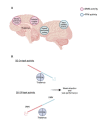The consequences of sleep deprivation on cognitive performance
- PMID: 37045455
- PMCID: PMC10155483
- DOI: 10.17712/nsj.2023.2.20220108
The consequences of sleep deprivation on cognitive performance
Abstract
Although not fully understood, sleep is accepted as a vital and organized sequence of events that follows a regular cyclic program each night to ensure the human body can perform at its optimum. A lack of sleep, or sleep deprivation (SD), is a widespread phenomenon that can induce adverse changes in cognitive performance. This review focused on the biological explanation as well as the research investigating the numerous effects that SD can have on cognition. A reduction in sleep does not occur independently of the effects on memory, attention, alertness, judgment, decision-making, and overall cognitive abilities in the brain, resulting in decreased function and impaired cognitive performance.
Copyright: © Neurosciences.
Figures





Similar articles
-
Effects of sleep deprivation on cognition.Prog Brain Res. 2010;185:105-29. doi: 10.1016/B978-0-444-53702-7.00007-5. Prog Brain Res. 2010. PMID: 21075236 Review.
-
The ability to self-monitor cognitive performance during 60 h total sleep deprivation and following 2 nights recovery sleep.J Sleep Res. 2018 Aug;27(4):e12633. doi: 10.1111/jsr.12633. Epub 2017 Nov 20. J Sleep Res. 2018. PMID: 29159907
-
Cognitive flexibility: A distinct element of performance impairment due to sleep deprivation.Accid Anal Prev. 2019 May;126:191-197. doi: 10.1016/j.aap.2018.02.013. Epub 2018 Mar 15. Accid Anal Prev. 2019. PMID: 29549968 Clinical Trial.
-
Hormone treatment gives no benefit against cognitive changes caused by acute sleep deprivation in postmenopausal women.Neuropsychopharmacology. 2006 Sep;31(9):2079-88. doi: 10.1038/sj.npp.1301056. Epub 2006 Mar 15. Neuropsychopharmacology. 2006. PMID: 16541085
-
Effects of modafinil on cognitive performance and alertness during sleep deprivation.Curr Pharm Des. 2006;12(20):2457-71. doi: 10.2174/138161206777698819. Curr Pharm Des. 2006. PMID: 16842170 Review.
Cited by
-
Examining Specific Theory-of-Mind Aspects in Amnestic and Non-Amnestic Mild Cognitive Impairment: Their Relationships with Sleep Duration and Cognitive Planning.Brain Sci. 2025 Jan 10;15(1):57. doi: 10.3390/brainsci15010057. Brain Sci. 2025. PMID: 39851425 Free PMC article.
-
Probiotic supplementation for optimizing athletic performance: current evidence and future perspectives for microbiome-based strategies.Front Nutr. 2025 Jul 15;12:1572687. doi: 10.3389/fnut.2025.1572687. eCollection 2025. Front Nutr. 2025. PMID: 40735239 Free PMC article. Review.
-
Investigating the Relationship Between Ultra-Processed Food Consumption and Academic Performance in the Adolescent Population: The EHDLA Study.Nutrients. 2025 Jan 31;17(3):524. doi: 10.3390/nu17030524. Nutrients. 2025. PMID: 39940382 Free PMC article.
-
The moderating role of aerobic exercise in the relationship between stress and cognitive functions.Sci Rep. 2025 Aug 9;15(1):29131. doi: 10.1038/s41598-025-14202-w. Sci Rep. 2025. PMID: 40781117 Free PMC article.
-
Quetiapine improves sensorimotor gating deficit in a sleep deprivation-induced rat model.Sleep Biol Rhythms. 2023 Dec 14;22(2):269-278. doi: 10.1007/s41105-023-00504-x. eCollection 2024 Apr. Sleep Biol Rhythms. 2023. PMID: 38524169 Free PMC article.
References
-
- Petrides M, Milner B.. Deficits on subject-ordered tasks after frontal- and temporal-lobe lesions in man. Neuropsychologia 1982; 20: 249–262. - PubMed
-
- Yoo SS, Gujar N, Hu P, Jolesz FA, Walker MP.. The human emotional brain without sleep--a prefrontal amygdala disconnect. Curr Biol 2007; 17: R877–R878. - PubMed
Publication types
MeSH terms
LinkOut - more resources
Full Text Sources
